 Three cheers for this year’s winners of our 350 for 50 contest, now in its 15th year! Young writers were challenged to compose a short, 350-word story that included the sentence “The sound was impossible to ignore.” In addition to having their stories illustrated with original artwork, each winner enjoyed a $50 online literary shopping spree. Congratulations to all!
Three cheers for this year’s winners of our 350 for 50 contest, now in its 15th year! Young writers were challenged to compose a short, 350-word story that included the sentence “The sound was impossible to ignore.” In addition to having their stories illustrated with original artwork, each winner enjoyed a $50 online literary shopping spree. Congratulations to all!
Illustrations by Aliisa Lee
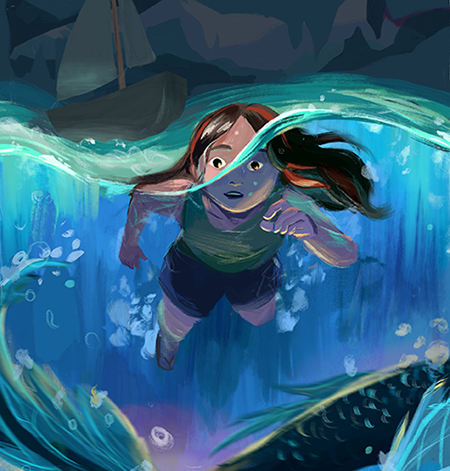 THE SIREN’S SONG
THE SIREN’S SONG
by Annie Wang, age 10
I know better than this, I told myself. I know better than to sail into a cave with mermaids who can sing you to death. And I know better than to drag my friends into this too. Still, we keep rowing. Each time the oars hit the water’s surface, I feel the siren’s presence. I glance behind my shoulder, and see a green fishtail. We were officially in the siren cave.
The next step was vital. Get tied to the mast for protection. Only then could I listen in safety. Listen as the sirens sang their songs. Unfortunately, before my friends could tie me up, the sirens began to sing, I couldn’t resist. The sound was impossible to ignore. Before anyone could react, I dove headfirst into the water. Behind me, I could hear my friends shouting my name, but the siren’s song swallowed me, and I disappeared.
Immediately, I was thrown into a different world. The sirens sang about my past, and how I became a sailor. The verses were different parts of my life, with one thing in common, the loneliness and feeling of rejection from everyone I knew.
The last verse was different. The sirens didn’t sing about my past. They sang about my future, as if personally calling to me. They sang to me about the world I longed for where everyone loved me, and hugged me like I mattered, even my sister shared her toys with me. My teachers praised me for doing good on homework, and I had someone to sit with during lunch. This alternate universe was everything I had imagined, and it could come true. All I had to do was reach out to the sirens’ outstretched hand and hold on tightly.
The hand wasn’t one of the sirens however. My friends had come to rescue me. But the sirens had already won my trust. I couldn’t be pulled away. I could still join the sirens but, would I sacrifice my friendship for a better future?
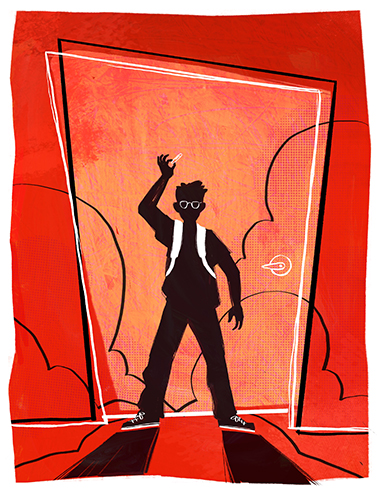 THE HALLWAY HOUDINI
THE HALLWAY HOUDINI
by Zachary Wen, age 12
As I stepped out the door of my dorm room, I heard a click behind me…and froze. The sound was impossible to ignore. It was the sound of stupidity. It was the sound of locking yourself out of your own room. I threw my bookbag to the floor, and snapped back to face the door. Filled with dread, I put my hand to the handle, praying it would still be unlocked. It wasn’t.
I felt sick to my stomach, and paced the hallway, thinking of ways to get back in.
My first instinct was to brute force it. Putting my foot against the wall, I pulled forcefully. When the door didn’t budge, I really started to panic.
Luckily, bad ideas were my specialty. Thinking I was some type of 007 agent, I attempted to get into the ventilation shaft. Taking a breath, I jumped up and found a handhold. The only problem was that our dorm rooms weren’t exactly what you’d call “premium residences.” Meaning all ceiling tiles within a five-foot radius fell down in a mess of dust, white powder, and Styrofoam boards. Along with it came a side of unnecessarily loud sounds: clattering, crashing, and smashing.
Our neighbors in room 207 came out, blinking in confusion. They feasted their eyes on the mess.
“Cool,” one of them said, while munching on his Lay’s.
Then their door slammed.
Deciding to clean the mess later, I continued brainstorming ways to get back into the room. Deciding to go with the “international spy” theme, I tried to picklock the door with a paperclip from my class notes .
Recalling knowledge I had acquired during the summer, I wiggled the “pin,” and finally heard a click—the sound of the paperclip getting stuck. Trying to yank it out only got me friction burns. Then, to my surprise, the knob twisted, as if of its own accord. I jumped back in surprise.
The door swung open, I stared into the face of my disoriented roommate, still in his pajamas, a large dollop of shaving cream on chin.
“Dude. What are you doing?”
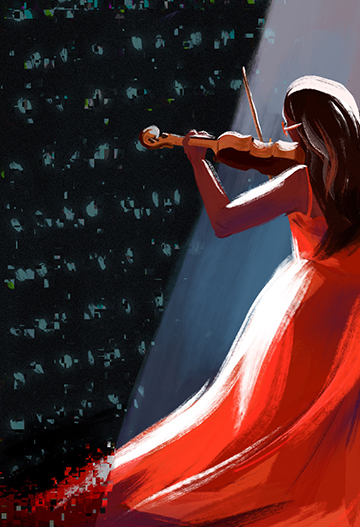 SOUNDS OF MUSIC
SOUNDS OF MUSIC
by Shreya Visvanathan, age 14
I stepped on stage, my nerves tingling, my mind a jumble of thoughts. I drew in three long, deep breaths and tried to exhale out all of my worries and angst. I rubbed my sweaty palms and gripped the back of my violin firmly. I tightened my bow to allow for a smooth, melodious tone and plastered a smile on my face. The spotlight was on me now. My first solo concert.
Now remember, a voice echoed in my head, Exactly 8 beats before you come in. I nodded and started counting.
…1…2…3…
I slowly turned my head to look at the audience.
…4…
I squinted ever so slightly only to make out entire rows of hunched heads and drooping shoulders facing lit up screens.
…5…
Not a soul looked at me and I was about to start.
…6…
PHONES! People were on their PHONES! Here I was shaking with fear trying to seek validation from the audience and no one cared enough to look up. All the hours of diligent, intense, repeated practice until the tips of my fingers resembled the rich, dark shade of my crimson dress. What if I didn’t play? Would they know? Or care?
…7…
I closed my eyes. I see musical notes floating above my eyes and the opening refrain playing in my ear. The Beethoven doll that sits on my piano waved his baton at me. I reflect on his determination, despite insurmountable odds, to write beautiful music. Suddenly I realized I owe it to him. I’m playing but a tiny piece of his work, and I owe it to him to get that at least right.
…8…
I smiled genuinely for the first time. My hour of glory.
…
I placed my violin on my shoulder and began.
I confidently struck a chord and gracefully pulled my bow through the strings of my violin to play the opening note. The sound of yearning, the sound of hope, so powerful, so euphonious yet so poignant. The heads moved up like synchronized swimmers and stared right at me.
The sound was impossible to ignore.
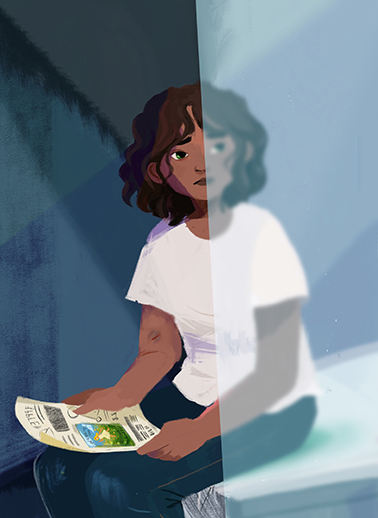 #3799F
#3799F
by Willow Yoo, age 16
She winced as the chip passed into her veined arm, “Do we have to keep doing this so often?” The doctor’s eyes were covered by a plastic shield, his eyes covered as he stood above her. His mouth was set in a firm line, his lab coat pristine without a speck of dirt or stain to be seen.
“It’s your planned monthly chip insert. It will be sore,” The doctor let the droplets of blood fall into a small plastic bag and scribbled #3799F.
“But my mom, she paid for the Plus plan so I didn’t have to do as many chip updates,” Ella protested, feeling her face growing hotter by the second, “She worked extra shifts at the daycare the past four months to be able to afford one semester of Plus.”
“I’m sorry, Miss, but haven’t you heard? Plus is now the same as Regular, the Head has introduced a Lux tier.” The doctor turned away and exited, his lab coat swishing as his squeaky chukkas traced the clean tiles of the floor. The sound was impossible to ignore.
Ella’s vision blurred as she gazed at the harsh slashes of #3799F at the top of her paper, smudged with fat tears, cursing the smiling woman in the advertisement below. She was leaping through a field of dandelions as glistening letters spelled, “Bring out your happiest self with BetterMind, Emotion Regulator©!” The gray bulge in Ella’s arm had been a constant since her mother had noticed her frequent sleeping and mood swings.
“Ella, don’t worry,” Her mother had said, “We’ll get you fixed up right away.” After her mother’s BetterMind app trial with Ella’s first chip implant, she hadn’t looked back.
Ella sat back in the crunchy paper on top of her chair, scrutinizing a transparent panel on the wall across. She got up, ignoring the every-visit-warnings of “Don’t do anything” as she made her way to the mysterious glass. Cautiously reaching up, she rapped on the glass before peering closer.
Staring back at her was a huddle of white lab coats, all smiling coldly.
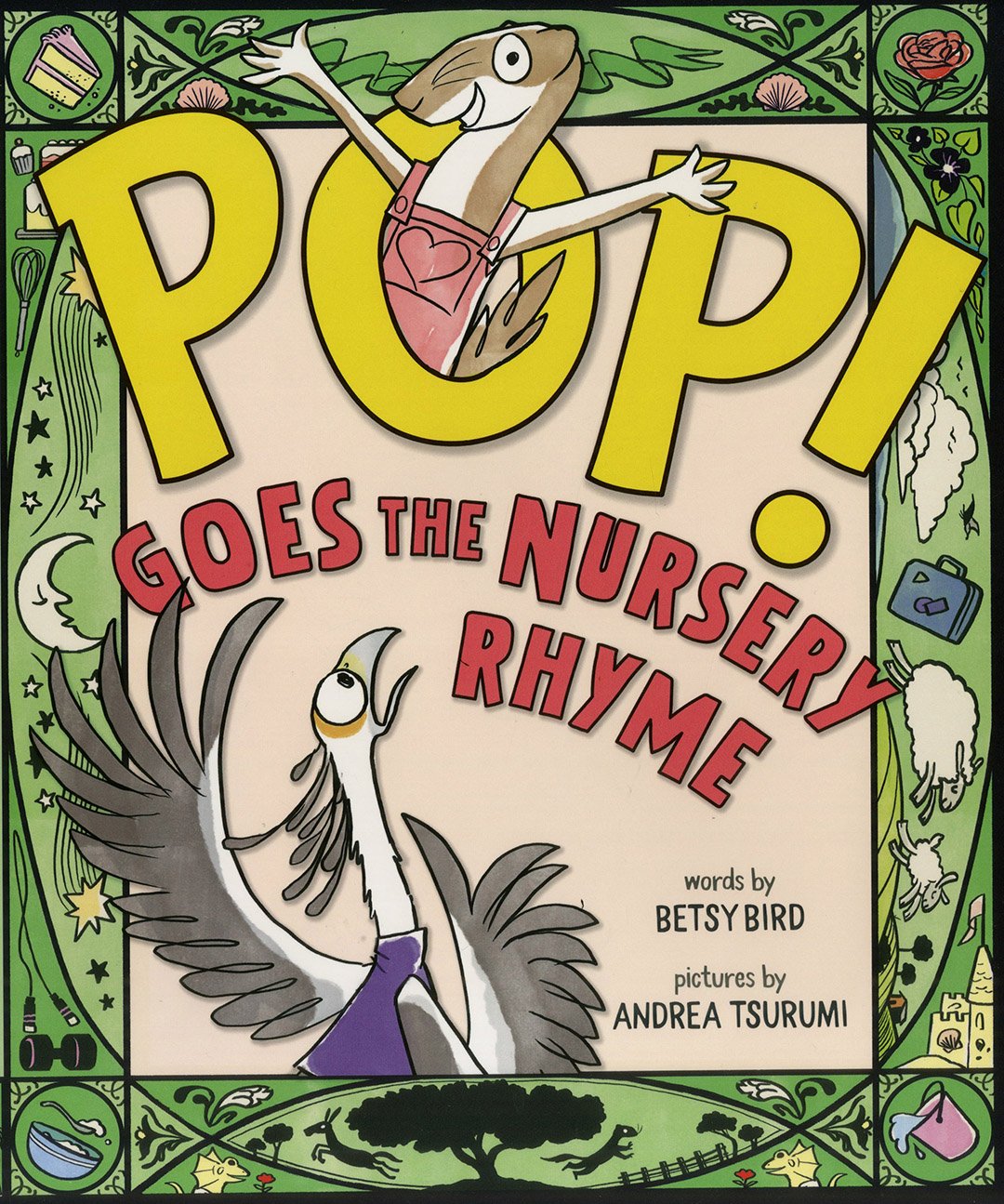 Folks, it was a total story time PARTY! Recently, we had the honor of collaborating with the Princeton Public Library and jaZams to bring the tremendous Betsy Bird and the terrific Andrea Tsurumi to Princeton with their new book Pop! Goes the Nursery Rhyme.
Folks, it was a total story time PARTY! Recently, we had the honor of collaborating with the Princeton Public Library and jaZams to bring the tremendous Betsy Bird and the terrific Andrea Tsurumi to Princeton with their new book Pop! Goes the Nursery Rhyme.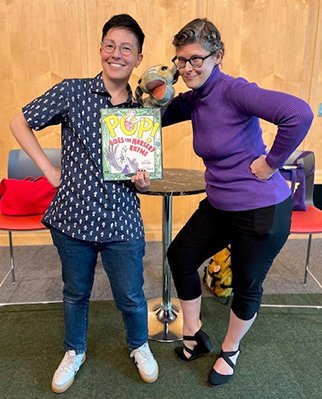
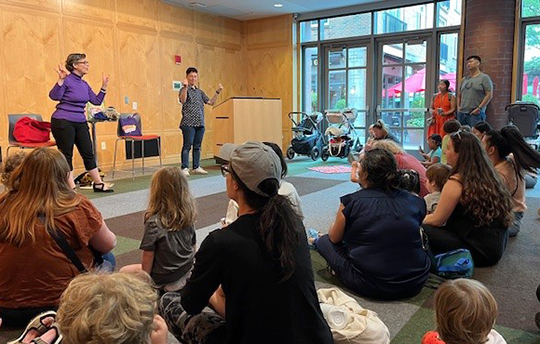
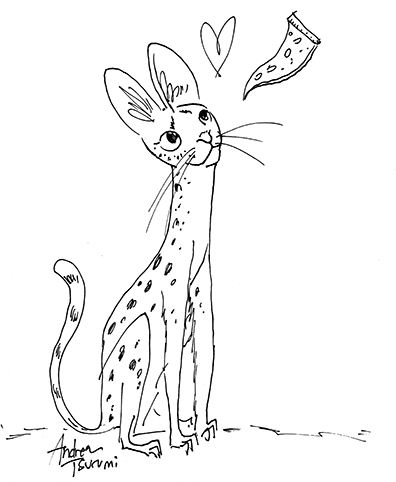 Pop! Goes the Nursery Rhyme (Union Square Kids, 2025) begins as a nursery rhyme book, but things goes quickly off the rails as a highly bombastic Weasel interrupts absolutely EVERY rhyme, much to the chagrin of the story’s narrator, a harried Secretary Bird. Kids get both the benefit of classic rhymes and the hilarious irreverence of the Weasel. It’s a wonderful and charming read-aloud, and Andrea’s jubilant and evocative illustrations build anticipation for every page turn. Our audience loved it!
Pop! Goes the Nursery Rhyme (Union Square Kids, 2025) begins as a nursery rhyme book, but things goes quickly off the rails as a highly bombastic Weasel interrupts absolutely EVERY rhyme, much to the chagrin of the story’s narrator, a harried Secretary Bird. Kids get both the benefit of classic rhymes and the hilarious irreverence of the Weasel. It’s a wonderful and charming read-aloud, and Andrea’s jubilant and evocative illustrations build anticipation for every page turn. Our audience loved it!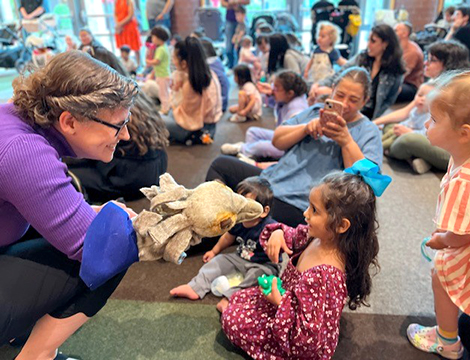 Andrea also circulated the crowds with their sketch book, showing kids what original sketches look like, and answering questions.
Andrea also circulated the crowds with their sketch book, showing kids what original sketches look like, and answering questions.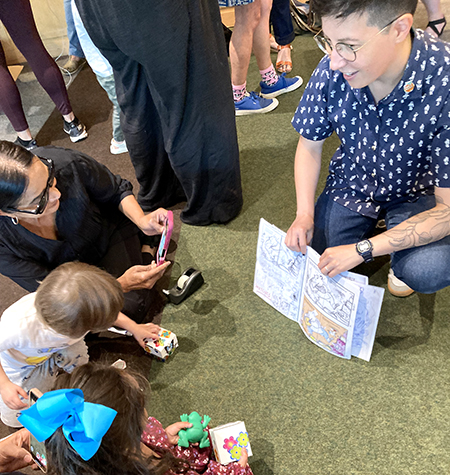 My portion of the program was the craft project, which of course had to be an enthusiastic weasel popping out of a decorated box!
My portion of the program was the craft project, which of course had to be an enthusiastic weasel popping out of a decorated box!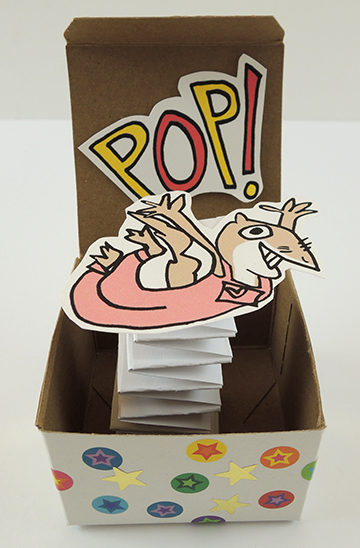
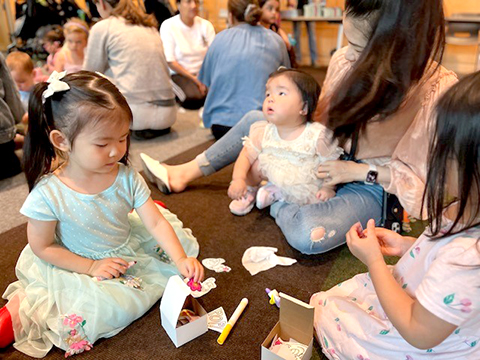 Families were also welcome to bring a little literacy love home, and acquire copies of the book for Betsy and Andrea to sign.That portion of the event was sponsored by jaZams, our independent, locally owned, and family run toy store. We love you jaZams!
Families were also welcome to bring a little literacy love home, and acquire copies of the book for Betsy and Andrea to sign.That portion of the event was sponsored by jaZams, our independent, locally owned, and family run toy store. We love you jaZams!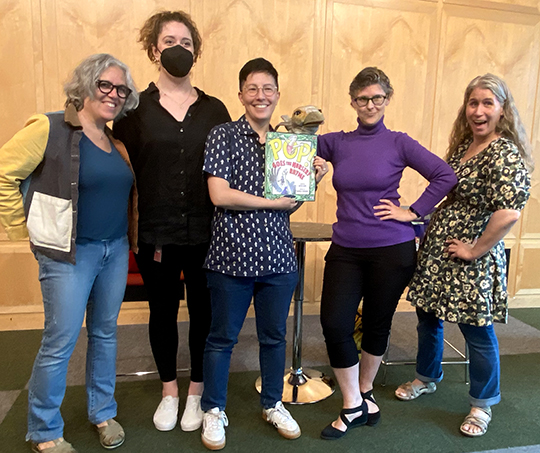

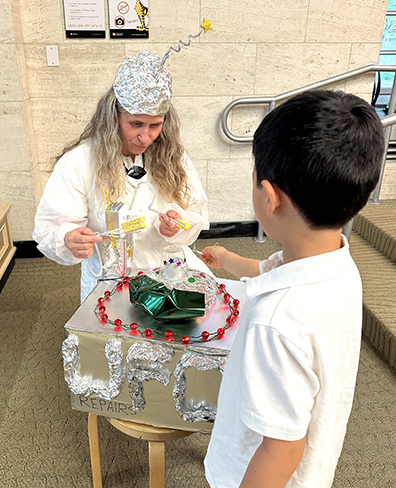 It’s a beautiful day in the galaxy, but if your spaceship’s hyperdrive starts to hyperdroop, bring it into our full service UFO repair station! We even clean windows!
It’s a beautiful day in the galaxy, but if your spaceship’s hyperdrive starts to hyperdroop, bring it into our full service UFO repair station! We even clean windows!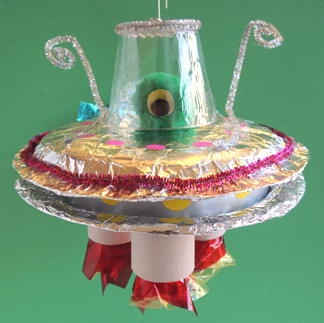
 I’ve been working with kids for decades, and sometimes I forget how powerful a box, tin foil, strand of lights, mesh tubing, and drinking straws can be. That’s basically all I used to create this repair shop. But the reaction to the set up was so powerful – customers lined up for a solid 20 minutes, coming back repeatedly with new and unique problems their UFOs were experiencing. I would hand them them the repair “wands” and we would boop and bleep our way to fixing the engines.
I’ve been working with kids for decades, and sometimes I forget how powerful a box, tin foil, strand of lights, mesh tubing, and drinking straws can be. That’s basically all I used to create this repair shop. But the reaction to the set up was so powerful – customers lined up for a solid 20 minutes, coming back repeatedly with new and unique problems their UFOs were experiencing. I would hand them them the repair “wands” and we would boop and bleep our way to fixing the engines.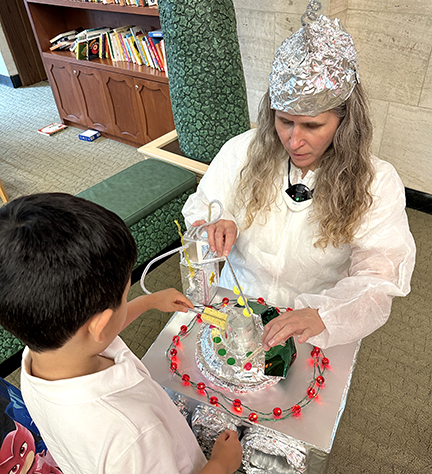
 Three cheers for this year’s winners of our 350 for 50 contest, now in its 15th year! Young writers were challenged to compose a short, 350-word story that included the sentence “The sound was impossible to ignore.” In addition to having their stories illustrated with original artwork, each winner enjoyed a $50 online literary shopping spree. Congratulations to all!
Three cheers for this year’s winners of our 350 for 50 contest, now in its 15th year! Young writers were challenged to compose a short, 350-word story that included the sentence “The sound was impossible to ignore.” In addition to having their stories illustrated with original artwork, each winner enjoyed a $50 online literary shopping spree. Congratulations to all! THE SIREN’S SONG
THE SIREN’S SONG THE HALLWAY HOUDINI
THE HALLWAY HOUDINI SOUNDS OF MUSIC
SOUNDS OF MUSIC #3799F
#3799F